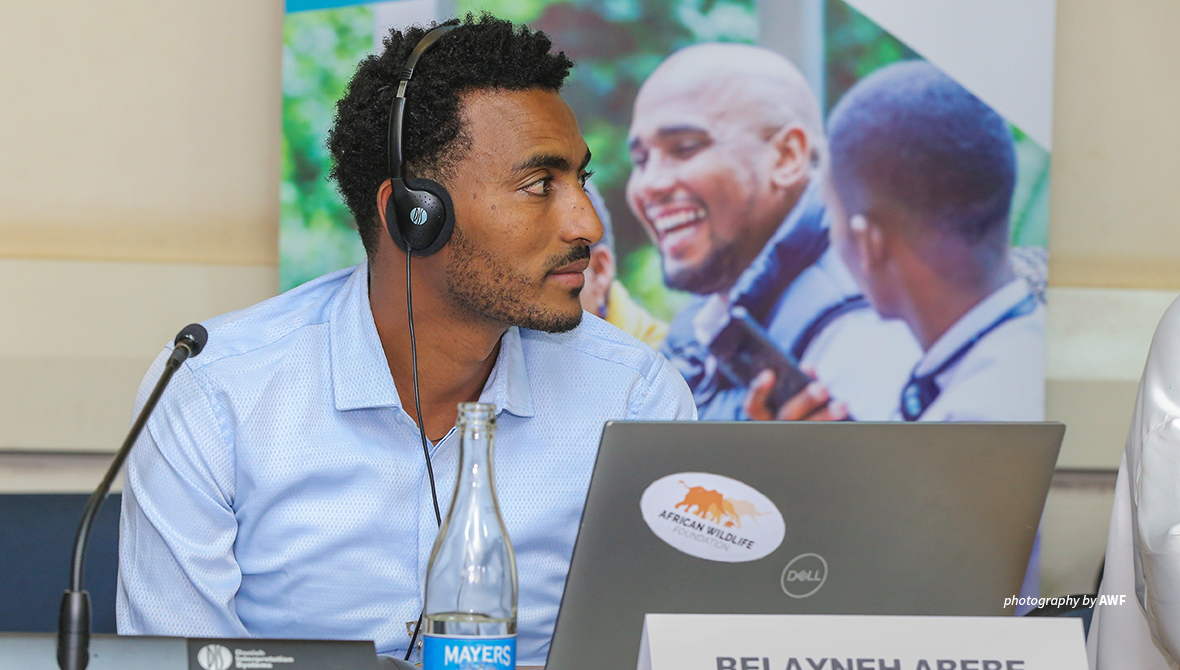Meet Belayneh, an ecologist from Ethiopia engaging leaders at COP27

2022 Charles R. Wall Young African Policy Fellow Belayneh Abebe is an AWF ecologist in the Simien Mountains landscape
Comprising environmental policy experts, youth networks, and grassroots conservation groups, African Wildlife Foundation’s delegation to the 2022 United Nations Climate Change Conference also includes two professionals enrolled in AWF’s 2022 Charles R. Wall Young African Policy Fellows program.
Belayneh Abebe, an AWF ecologist working in Ethiopia’s Simien Mountains landscape, is one of the policy fellows attending the 27th Conference of the Parties (COP27) in Sharm El Sheikh, Egypt. He shares how the program has provided critical insight into global environmental negotiations and how this experience will inform his community conservation efforts on the ground.
What practical skills from the Charles R. Wall Young African Policy Fellows program are especially relevant or valuable to you?
I am thrilled to be part of the training and hands-on workshops as I have learnt more about the multilateral environmental agreement negotiation processes, in particular, how negotiators prepare position statements and policy briefs to influence environmental governance. This is interesting for me as I work on the ground in the Simien Mountains National Park, and I can see and identify the challenges in our biodiversity conservation efforts. This insight has enabled me to write detailed policy briefs for specific issues and push for strategic decisions and interventions by higher officials. Moreover, it is even more intriguing to learn the appropriate language spoken and written at these conventions. Apart from learning new things, the Charles R. Wall Young African Policy Fellows workshops have given me an opportunity to establish networks with young fellows and senior experts in biodiversity conservation matters and negotiations.
Which climate solutions are you hoping to learn more about and contribute to at UNFCCC COP27?
Climate change has serious impacts on biodiversity and current global warming rates are already affecting species and ecosystems around the world, particularly the most vulnerable ecosystems such as coral reefs and polar ecosystems. Extreme weather events are becoming more frequent and their impacts more severe. At COP27, I want to gain more insights into the climate impacts on mountain ecosystems and how I can contribute to building resilient communities that live in these biodiversity-rich regions. To this end, I am keen to learn more about climate financing for vulnerable ecosystems, informed by the experiences of other young people working towards climate change actions and biodiversity conservation across the world.
How does your work increase youth participation in conservation?
While I am at COP27, I aim to utilize every opportunity to not only network with fellow peers but also to be a resource to others by sharing what key solutions AWF has been delivering in highland ecosystems like the Simien Mountains National Park where I work.
As a ground-level officer, I implement several biodiversity programs in the region, particularly around protected area management effectiveness, ecological monitoring, and community engagement. While engaging with communities from the region, I have learnt that every individual plays an important role in protecting biodiversity and socioeconomic upliftment. This has been through targeted participation in the biodiversity economy at all levels.
In addition to engaging with young community members, I work with national and local officials, organizations, community-based organizations, and partners to boost sustainability by improving coordination and partnership between all stakeholders. This will eventually help elevate young Africans to reshape the continent's development narrative through effective policies because they actively drive sustainable solutions for our continent.